- Home
- Sandra Cisneros
The House on Mango Street Page 5
The House on Mango Street Read online
Page 5
And then it’s Rachel who starts it:
Skip, skip,
snake in your hips.
Wiggle around
and break your lip.
Lucy waits a minute before her turn. She is thinking. Then she begins:
The waitress with the big fat hips
who pays the rent with taxi tips …
says nobody in town will kiss her on the lips
because …
because she looks like Christopher Columbus!
Yes, no, maybe so. Yes, no, maybe so.
She misses on maybe so. I take a little while before my turn, take a breath, and dive in:
Some are skinny like chicken lips.
Some are baggy like soggy Band-Aids
after you get out of the bathtub.
I don’t care what kind I get.
Just as long as I get hips.
Everybody getting into it now except Nenny who is still humming not a girl, not a boy, just a little baby. She’s like that.
When the two arcs open wide like jaws Nenny jumps in across from me, the rope tick-ticking, the little gold earrings our mama gave her for her First Holy Communion bouncing. She is the color of a bar of naphtha laundry soap, she is like the little brown piece left at the end of the wash, the hard little bone, my sister. Her mouth opens. She begins:
My mother and your mother were washing clothes.
My mother punched your mother right in the nose.
What color blood came out?
Not that old song, I say. You gotta use your own song. Make it up, you know? But she doesn’t get it or won’t. It’s hard to say which. The rope turning, turning, turning.
Engine, engine number nine,
running down Chicago line.
If the train runs off the track
do you want your money back?
Do you want your MONEY back?
Yes, no, maybe so. Yes, no, maybe so …
I can tell Lucy and Rachel are disgusted, but they don’t say anything because she’s my sister.
Yes, no, maybe so. Yes, no, maybe so …
Nenny, I say, but she doesn’t hear me. She is too many light-years away. She is in a world we don’t belong to anymore. Nenny. Going. Going.
Y-E-S spells yes and out you go!
The First Job
It wasn’t as if I didn’t want to work. I did. I had even gone to the social security office the month before to get my social security number. I needed money. The Catholic high school cost a lot, and Papa said nobody went to public school unless you wanted to turn out bad.
I thought I’d find an easy job, the kind other kids had, working in the dime store or maybe a hotdog stand. And though I hadn’t started looking yet, I thought I might the week after next. But when I came home that afternoon, all wet because Tito had pushed me into the open water hydrant—only I had sort of let him—Mama called me in the kitchen before I could even go and change, and Aunt Lala was sitting there drinking her coffee with a spoon. Aunt Lala said she had found a job for me at the Peter Pan Photo Finishers on North Broadway where she worked, and how old was I, and to show up tomorrow saying I was one year older, and that was that.
So the next morning I put on the navy blue dress that made me look older and borrowed money for lunch and bus fare because Aunt Lala said I wouldn’t get paid till the next Friday, and I went in and saw the boss of the Peter Pan Photo Finishers on North Broadway where Aunt Lala worked and lied about my age like she told me to and sure enough, I started that same day.
In my job I had to wear white gloves. I was supposed to match negatives with their prints, just look at the picture and look for the same one on the negative strip, put it in the envelope, and do the next one. That’s all. I didn’t know where these envelopes were coming from or where they were going. I just did what I was told.
It was real easy, and I guess I wouldn’t have minded it except that you got tired after a while and I didn’t know if I could sit down or not, and then I started sitting down only when the two ladies next to me did. After a while they started to laugh and came up to me and said I could sit when I wanted to, and I said I knew.
When lunchtime came, I was scared to eat alone in the company lunchroom with all those men and ladies looking, so I ate real fast standing in one of the washroom stalls and had lots of time left over, so I went back to work early. But then break time came, and not knowing where else to go, I went into the coatroom because there was a bench there.
I guess it was the time for the night shift or middle shift to arrive because a few people came in and punched the time clock, and an older Oriental man said hello and we talked for a while about my just starting, and he said we could be friends and next time to go in the lunchroom and sit with him, and I felt better. He had nice eyes and I didn’t feel so nervous anymore. Then he asked if I knew what day it was, and when I said I didn’t, he said it was his birthday and would I please give him a birthday kiss. I thought I would because he was so old and just as I was about to put my lips on his cheek, he grabs my face with both hands and kisses me hard on the mouth and doesn’t let go.
Papa
Who Wakes Up
Tired
in the Dark
Your abuelito is dead, Papa says early one morning in my room. Está muerto, and then as if he just heard the news himself, crumples like a coat and cries, my brave Papa cries. I have never seen my Papa cry and don’t know what to do.
I know he will have to go away, that he will take a plane to Mexico, all the uncles and aunts will be there, and they will have a black-and-white photo taken in front of the tomb with flowers shaped like spears in a white vase because this is how they send the dead away in that country.
Because I am the oldest, my father has told me first, and now it is my turn to tell the others. I will have to explain why we can’t play. I will have to tell them to be quiet today.
My Papa, his thick hands and thick shoes, who wakes up tired in the dark, who combs his hair with water, drinks his coffee, and is gone before we wake, today is sitting on my bed.
And I think if my own Papa died what would I do. I hold my Papa in my arms. I hold and hold and hold him.
Born Bad
Most likely I will go to hell and most likely I deserve to be there. My mother says I was born on an evil day and prays for me. Lucy and Rachel pray too. For ourselves and for each other … because of what we did to Aunt Lupe.
Her name was Guadalupe and she was pretty like my mother. Dark. Good to look at. In her Joan Crawford dress and swimmer’s legs. Aunt Lupe of the photographs.
But I knew her sick from the disease that would not go, her legs bunched under the yellow sheets, the bones gone limp as worms. The yellow pillow, the yellow smell, the bottles and spoons. Her head thrown back like a thirsty lady. My aunt, the swimmer.
Hard to imagine her legs once strong, the bones hard and parting water, clean sharp strokes, not bent and wrinkled like a baby, not drowning under the sticky yellow light. Second-floor rear apartment. The naked light bulb. The high ceilings. The light bulb always burning.
I don’t know who decides who deserves to go bad. There was no evil in her birth. No wicked curse. One day I believe she was swimming, and the next day she was sick. It might have been the day that gray photograph was taken. It might have been the day she was holding cousin Totchy and baby Frank. It might have been the moment she pointed to the camera for the kids to look and they wouldn’t.
Maybe the sky didn’t look the day she fell down. Maybe God was busy. It could be true she didn’t dive right one day and hurt her spine. Or maybe the story that she fell very hard from a high step stool, like Totchy said, is true.
But I think diseases have no eyes. They pick with a dizzy finger anyone, just anyone. Like my aunt who happened to be walking down the street one day in her Joan Crawford dress, in her funny felt hat with the black feather, cousin Totchy in one hand, baby Frank in the other.
Sometimes you get used to the sick and someti
mes the sickness, if it is there too long, gets to seem normal. This is how it was with her, and maybe this is why we chose her.
It was a game, that’s all. It was the game we played every afternoon ever since that day one of us invented it—I can’t remember who—I think it was me.
You had to pick somebody. You had to think of someone everybody knew. Someone you could imitate and everyone else would have to guess who it was. It started out with famous people: Wonder Woman, the Beatles, Marilyn Monroe.… But then somebody thought it’d be better if we changed the game a little, if we pretended we were Mr. Benny, or his wife Bianca, or Ruthie, or anybody we knew.
I don’t know why we picked her. Maybe we were bored that day. Maybe we got tired. We liked my aunt. She listened to our stories. She always asked us to come back. Lucy, me, Rachel. I hated to go there alone. The six blocks to the dark apartment, second-floor rear building where sunlight never came, and what did it matter? My aunt was blind by then. She never saw the dirty dishes in the sink. She couldn’t see the ceilings dusty with flies, the ugly maroon walls, the bottles and sticky spoons. I can’t forget the smell. Like sticky capsules filled with jelly. My aunt, a little oyster, a little piece of meat on an open shell for us to look at. Hello, hello. As if she had fallen into a well.
I took my library books to her house. I read her stories. I liked the book The Waterbabies. She liked it too. I never knew how sick she was until that day I tried to show her one of the pictures in the book, a beautiful color picture of the water babies swimming in the sea. I held the book up to her face. I can’t see it, she said, I’m blind. And then I was ashamed.
She listened to every book, every poem I read her. One day I read her one of my own. I came very close. I whispered it into the pillow:
I want to be
like the waves on the sea,
like the clouds in the wind,
but I’m me.
One day I’ll jump
out of my skin.
I’ll shake the sky
like a hundred violins.
That’s nice. That’s very good, she said in her tired voice. You just remember to keep writing, Esperanza. You must keep writing. It will keep you free, and I said yes, but at that time I didn’t know what she meant.
The day we played the game, we didn’t know she was going to die. We pretended with our heads thrown back, our arms limp and useless, dangling like the dead. We laughed the way she did. We talked the way she talked, the way blind people talk without moving their head. We imitated the way you had to lift her head a little so she could drink water, she sucked it up slow out of a green tin cup. The water was warm and tasted like metal. Lucy laughed. Rachel too. We took turns being her. We screamed in the weak voice of a parrot for Totchy to come and wash those dishes. It was easy.
We didn’t know. She had been dying such a long time, we forgot. Maybe she was ashamed. Maybe she was embarrassed it took so many years. The kids who wanted to be kids instead of washing dishes and ironing their papa’s shirts, and the husband who wanted a wife again.
And then she died, my aunt who listened to my poems.
And then we began to dream the dreams.
Elenita,
Cards, Palm, Water
Elenita, witch woman, wipes the table with a rag because Ernie who is feeding the baby spilled Kool-Aid. She says: Take that crazy baby out of here and drink your Kool-Aid in the living room. Can’t you see I’m busy? Ernie takes the baby into the living room where Bugs Bunny is on T.V.
Good lucky you didn’t come yesterday, she says. The planets were all mixed up yesterday.
Her T.V. is color and big and all her pretty furniture made out of red fur like the teddy bears they give away in carnivals. She has them covered with plastic. I think this is on account of the baby.
Yes, it’s a good thing, I say.
But we stay in the kitchen because this is where she works. The top of the refrigerator busy with holy candles, some lit, some not, red and green and blue, a plaster saint and a dusty Palm Sunday cross, and a picture of the voodoo hand taped to the wall.
Get the water, she says.
I go to the sink and pick the only clean glass there, a beer mug that says the beer that made Milwaukee famous, and fill it up with hot water from the tap, then put the glass of water on the center of the table, the way she taught me.
Look in it, do you see anything?
But all I see are bubbles.
You see anybody’s face?
Nope, just bubbles, I say.
That’s okay, and she makes the sign of the cross over the water three times and then begins to cut the cards.
They’re not like ordinary playing cards, these cards. They’re strange, with blond men on horses and crazy baseball bats with thorns. Golden goblets, sad-looking women dressed in old-fashioned dresses, and roses that cry.
There is a good Bugs Bunny cartoon on T.V. I know, I saw it before and recognize the music and wish I could go sit on the plastic couch with Ernie and the baby, but now my fortune begins. My whole life on that kitchen table: past, present, future. Then she takes my hand and looks into my palm. Closes it. Closes her eyes too.
Do you feel it, feel the cold?
Yes, I lie, but only a little.
Good, she says, los espíritus are here. And begins.
This card, the one with the dark man on a dark horse, this means jealousy, and this one, sorrow. Here a pillar of bees and this a mattress of luxury. You will go to a wedding soon and did you lose an anchor of arms, yes, an anchor of arms? It’s clear that’s what that means.
What about a house, I say, because that’s what I came for.
Ah, yes, a home in the heart. I see a home in the heart.
Is that it?
That’s what I see, she says, then gets up because the kids are fighting. Elenita gets up to hit and then hug them. She really does love them, only sometimes they are rude.
She comes back and can tell I’m disappointed. She’s a witch woman and knows many things. If you got a headache, rub a cold egg across your face. Need to forget an old romance? Take a chicken’s foot, tie it with red string, spin it over your head three times, then burn it. Bad spirits keeping you awake? Sleep next to a holy candle for seven days, then on the eighth day, spit. And lots of other stuff. Only now she can tell I’m sad.
Baby, I’ll look again if you want me to. And she looks again into the cards, palm, water, and says uh-huh.
A home in the heart, I was right.
Only I don’t get it.
A new house, a house made of heart. I’ll light a candle for you.
All this for five dollars I give her.
Thank you and goodbye and be careful of the evil eye. Come back again on a Thursday when the stars are stronger. And may the Virgin bless you. And shuts the door.
Geraldo
No Last Name
She met him at a dance. Pretty too, and young. Said he worked in a restaurant, but she can’t remember which one. Geraldo. That’s all. Green pants and Saturday shirt. Geraldo. That’s what he told her.
And how was she to know she’d be the last one to see him alive. An accident, don’t you know. Hit-and-run. Marin, she goes to all those dances. Uptown. Logan. Embassy. Palmer. Aragon. Fontana. The Manor. She likes to dance. She knows how to do cumbias and salsas and rancheras even. And he was just someone she danced with. Somebody she met that night. That’s right.
That’s the story. That’s what she said again and again. Once to the hospital people and twice to the police. No address. No name. Nothing in his pockets. Ain’t it a shame.
Only Marin can’t explain why it mattered, the hours and hours, for somebody she didn’t even know. The hospital emergency room. Nobody but an intern working all alone. And maybe if the surgeon would’ve come, maybe if he hadn’t lost so much blood, if the surgeon had only come, they would know who to notify and where.
But what difference does it make? He wasn’t anything to her. He wasn’t her boyfriend or anything like
that. Just another brazer who didn’t speak English. Just another wetback. You know the kind. The ones who always look ashamed. And what was she doing out at three a.m. anyway? Marin who was sent home with her coat and some aspirin. How does she explain?
She met him at a dance. Geraldo in his shiny shirt and green pants. Geraldo going to a dance.
What does it matter?
They never saw the kitchenettes. They never knew about the two-room flats and sleeping rooms he rented, the weekly money orders sent home, the currency exchange. How could they?
His name was Geraldo. And his home is in another country. The ones he left behind are far away, will wonder, shrug, remember. Geraldo—he went north … we never heard from him again.
Edna’s Ruthie
Ruthie, tall skinny lady with red lipstick and blue babushka, one blue sock and one green because she forgot, is the only grown-up we know who likes to play. She takes her dog Bobo for a walk and laughs all by herself, that Ruthie. She doesn’t need anybody to laugh with, she just laughs.
She is Edna’s daughter, the lady who owns the big building next door, three apartments front and back. Every week Edna is screaming at somebody, and every week somebody has to move away. Once she threw out a pregnant lady just because she owned a duck … and it was a nice duck too. But Ruthie lives here and Edna can’t throw her out because Ruthie is her daughter.
Ruthie came one day, it seemed, out of nowhere. Angel Vargas was trying to teach us how to whistle. Then we heard someone whistling—beautiful like the Emperor’s nightingale—and when we turned around there was Ruthie.
Sometimes we go shopping and take her with us, but she never comes inside the stores and if she does she keeps looking around her like a wild animal in a house for the first time.
She likes candy. When we go to Mr. Benny’s grocery she gives us money to buy her some. She says make sure it’s the soft kind because her teeth hurt. Then she promises to see the dentist next week, but when next week comes, she doesn’t go.

 Have You Seen Marie?
Have You Seen Marie? Woman Hollering Creek: And Other Stories
Woman Hollering Creek: And Other Stories The House on Mango Street
The House on Mango Street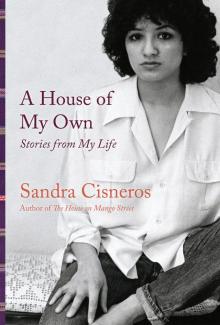 A House of My Own: Stories From My Life
A House of My Own: Stories From My Life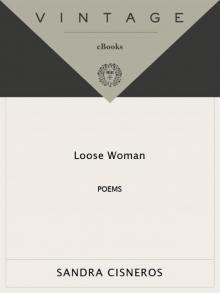 Loose Woman
Loose Woman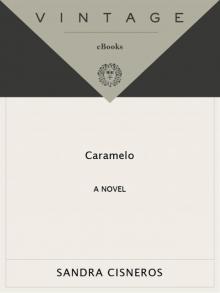 Caramelo
Caramelo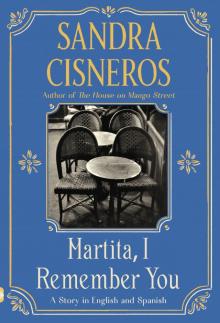 Martita, I Remember You/Martita, te recuerdo
Martita, I Remember You/Martita, te recuerdo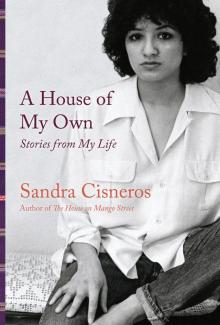 A House of My Own
A House of My Own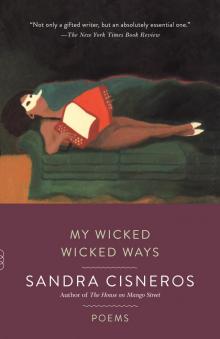 My Wicked Wicked Ways
My Wicked Wicked Ways